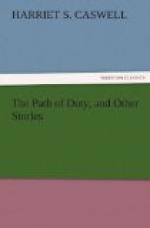industry; and although his home was for some years
two miles from any neighbour, it soon wore a pleasing
appearance. The most pleasing feature in the scene
was the beautiful stream of water which ran near his
dwelling, and after which he named his farm.
In five years from the time when he first settled
in the bush, he exchanged his rude log house for a
comfortable and convenient framed dwelling, with a
well-kept garden in front, and near his house were
left standing some fine shade-trees which added much
to the beauty of the place. In process of time,
the excellent quality of the soil in that range of
lots attracted others to locate themselves in the
vicinity; and Hazel-Brook farm soon formed the centre
of a fast growing neighbourhood. Two sons and
another daughter had been added to Mr. Ainslie’s
family during this time; and the birth of the little
girl was an occasion of much joy to all the family.
They had never forgotten “wee Susie,”
and all the love which they bore to her memory was
lavished upon this second daughter in the family.
The elder brothers were anxious to bestow the name
of their lost favourite upon their infant sister, but
the parents objected, having rather a dislike to the
practice, so common, of bestowing upon a child a name
that had belonged to the dead; and so the little girl
was named Jennette, after her grandmother, Mrs. Miller.
About this time old Mr. Miller died. He was an
old man, “full of days,” having seen nearly
eighty years of life. He had ever been a man
of strong constitution and robust health, and his last
illness was very short; and from the first he was
confident that he should never recover. When
he first addressed his family upon the subject they
were overwhelmed with grief. “Dinna greet
for me,” said he in a calm and hopeful voice,
“I ha’e already leeved ayont the period
allotted to the life o’ man. I ha’e
striven in my ain imperfect way to do my duty in this
life, an’ I am thankfu’ that I am able
to say that I dinna fear death; and I feel that when
I dee I shall gang hame to the house o’ a mercifu’
Father.” So peaceful was his departure,
that, although surrounded by his mourning friends,
they were unable to tell the exact moment of his death.
Like a wearied child that sleeps, he quietly passed
away. They had no burial ground in the settlement,
and he was laid to rest several miles from his home.
His family, with the exception of one son, had all
married and removed to homes of their own some time
previous to his death; and to this son was assigned
the happy task of watching over the declining years
of his widowed mother. Mr. Miller, as a dying
injunction, charged this son never to neglect his mother
in her old age, and most sacredly did he observe the
dying wishes of his father. Mrs. Miller was also
of advanced age. For three years longer she lingered,
and was then laid to rest beside her departed husband.




